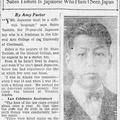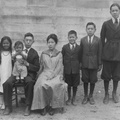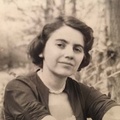Read Part 2 >>
In 1995, a conference on the Japanese American experience was held at Northwest College in Powell, Wyoming. Among the conference speakers were historian Yuji Ichioka, who presented a paper on Buddy Uno, and Hosokawa. According to surviving tapes of the sessions, Ichioka asserted during his presentation that Uno, despite his work for Tokyo and his belief in the superiority and honorable mission of Japan’s military, was NOT a traitor to the United States.
Rather, he was simply conflicted—a “marginal man” who never felt at home either in Japan or (because of racism) in the US. Ichioka concluded that there was no such thing as a totally 100% loyal Nisei. Rather, he maintained, all Nisei were just as marginalized and conflicted as Uno—he named Bill Hosokawa as one such example. Hosokawa, who was in the audience, did not then respond. However, at his own presentation the following day, Hosokawa differed strongly. After explaining that he had worked in Singapore and Shanghai, Hosokawa interjected that he had never lived in Japan and never supported the Japanese military. He added that he took exception to Ichioka’s comments and did not appreciate being lumped together with Buddy Uno.1
Yet the record is rather more complex than Bill Hosokawa’s latter-day comments would indicate. Although Hosokawa would be a staunch supporter of the United States against Japan during the Pacific War, he did indeed live and work in the Japanese empire before the war. There he ended up writing for the same collaborationist journal as had Buddy Uno, who remained pro-Japanese even after Pearl Harbor.
To be sure, Hosokawa’s writings for Far Eastern Review clearly differ in tone from Uno’s. Uno was an unabashed defender of Japan and its military, and was gullible as to the true nature of the occupation of China. Hosokawa’s stated goal was maintaining international peace, and uplifting the Asian masses. Like many liberals of all shades, he welcomed the end of white domination and racial chauvinism in the Far East. His writings called on both Washington and Tokyo to follow realistic policies and to compromise in the name of peace. Despite the cloud of official and unofficial censorship around him, he bravely (if fleetingly) expressed his distaste for Japan’s military occupation of China.
While he expressed skepticism about the anti-Japanese position of imperialist Western powers, he also stated the the position of the United States was based on international morality. In notable contrast to Buddy Uno, he approved the struggle to resist Nazi Germany.
All the same, Hosokawa’s writings, even if subject to surveillance by the occupation authorities, edged at times toward what would have been considered enemy propaganda under wartime conditions. Long after most Nisei on the West Coast, whether on grounds of principle or prudence, had ceased to justify Japan’s imperial expansion in Asia in the face of Washington’s repeated demands for withdrawal, Hosokawa continued to extol Tokyo’s efforts, even in the face of Japan’s brutality in China and occupation of French Indochina.
Conversely, he deplored pro-Chinese propaganda and repeatedly described the Chinese as backward and incapable of self-rule. He even drew an equivalence between the aid and technical advice furnished by Japan and the United States to their respective Chinese clients (a textbook case, to paraphrase Winston Churchill's bon mot, of remaining neutral between the fire brigade and the fire).
Worse, he soft-pedaled the totalitarian nature of Japanese society, portraying it as a response to war no different from that of other countries. He made only the most glancing reference to press censorship, which he mixed with glowing accounts of Neighborhood Councils giving anxious people patriotic work (the network of informants employed by the Councils he passed over entirely). His disquisition on the advantages of the invincible Japanese spirit over material difficulties resembled a good deal of Tokyo’s official propaganda.
Hosokawa’s overall language reflected a subtle pro-Japanese bias as well. Not only did he praise Japan’s efforts in occupied Manchuria, but in some cases he referred to the area as Manchukuo (the name of the puppet state created by Tokyo, and unrecognized by the Western democracies). He also made favorable references to Japan’s plan for a “Greater East Asian Co-Prosperity Sphere” as a sincere effort at regional leadership, rather than as a mask for exploitation.
What then do we make of this apparent contradiction? It should be stressed that Hosokawa was neither a shill for Japanese militarists nor a hypocrite—he was a man of genuine principle, who later displayed moral courage in expressing opinions at times that were not popular among the Nisei. (In the interests of full disclosure, I should note that I met Hosokawa on two occasions, and he helped publicize in his newspaper column some of my new discoveries about the causes of wartime Japanese removal).
Rather, it seems clear that like many young Nisei—and Hosokawa was just 23 when he moved to Asia—he felt a certain connection with Japan. Hosokawa’s own experience of discrimination on the West Coast due to his Japanese ancestry, though less decisive than Buddy Uno’s, would logically have helped motivate his expressed sympathy with Japan as a “have-not country” denied its fair share of resources by jealous “have countries,” as well as his skepticism about the motives of the anti-Japanese press. These factors, as well as his sincere pacifism and fear of another World War, made Hosokawa slow to appreciate fully the savage nature of Japan’s rule in Asia during the years before Pearl Harbor and its threat to international peace.
Notes:
1. William Hosokawa, “‘Good Old Days’ for the Foreigner in China—are Gone,” Far Eastern Review, October 1941, pp. 15-16, 36.
2. Bill Hosokawa, interview with author, January 8, 2005, Denver, CO.
3. Proceedings of Japanese American conference, Northwest College, 1995. I am indebted for this account to Arthur Hansen, who witnessed the exchange and tipped me off about it, and to Mike Mackey, who reviewed the tapes of the conference and prepared a summary of the statements made for my use. Arthur Hansen, emails to author with attachments from Mike Mackey, December 5-6, 2011.
© 2012 Greg Robinson





